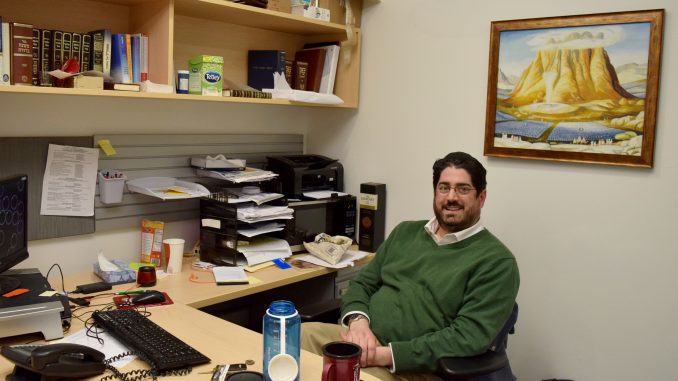
“It’s not only a religion—Judaism is a culture, it’s a nationality, it’s a peoplehood [and] it’s shared values. It’s really hard to define what it means to be a Jew.”
~Rabbi Daniel Levitt | Executive director of Temple Hillel
In anticipation of the hit film “Star Wars: The Force Awakens,” Rabbi Daniel Levitt, executive director of Temple Hillel, hosted two workshops in October and November likening ideas of the Force and being a Jedi to Jewish teachings and lifestyle.
“Star Wars is a great way to really bring to life those ideas and those thoughts,” said Levitt, who spent the last three years as a Hillel director in Canada.
Since August, Levitt has been in charge of staff, maintaining a budget, handling fundraising and being the public face of the organization, he wants to promote Judaism as being more than just a religion.
“You can be a Jew and not believe in God,” he said. “It’s not only a religion—Judaism is a culture, it’s a nationality, it’s a peoplehood [and] it’s shared values. It’s really hard to define what it means to be a Jew.”
With the time he has spent at Temple Hillel so far, Levitt said there isn’t much he feels needs to change thanks to capable student leaders who “really run the place.” But he hopes that he, and Hillel, can get the message out that the organization is a valuable resource for students and the university.
The group’s new 2016 student board president and vice president, Max Buchdahl and Melissa Payavis, respectively, are also in line with Levitt’s goals, particularly with reaching out to other organizations and the diverse communities making up the student body.
“Temple is a very diverse school, and I think if we just focused on the Jewish students then we wouldn’t be using our university to its fullest potential,” said Payavis, a sophomore media studies and production major.
“It’s always important to be understanding of other communities,” said Buchdahl, a sophomore journalism major. “Having those relationships with other communities builds our own community. I think it’s important to have that balance between having events with the Jewish community and branching out to the university community as a whole.”
Some of these events include a free Shabbat dinner on Feb. 5 with President Theobald, and a technology entrepreneurship fair in February that will highlight startup companies that have come out of Israel.
Concerning programs where Hillel students visit Israel, Levitt said he has made it a priority to divert attention away from the “one-dimensional conversation” surrounding Israel and have a “less polarizing, more educational and diverse message when it comes to Israel programming, that our students feel passionate about.”
Levitt is eager to support the religious beliefs of Jewish students, but he also wants to encourage everyone at Hillel to be open to all kinds of cultures and backgrounds.
“I want to provide for religious needs for students who have that need, and I want to expand people’s horizons and encourage experimentation and growth and learning in all different directions,” Levitt said.
“Ultimately, our mission is to inspire young Jewish students to be leaders within their communities, to make lifelong commitment to Jewish life, learning and the state of Israel,” he added. “Their leadership should go beyond the Jewish community.”
Albert Hong can be reached at albert.hong@temple.edu.


Be the first to comment